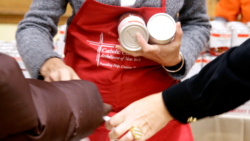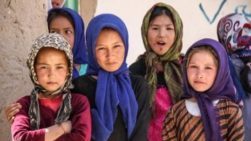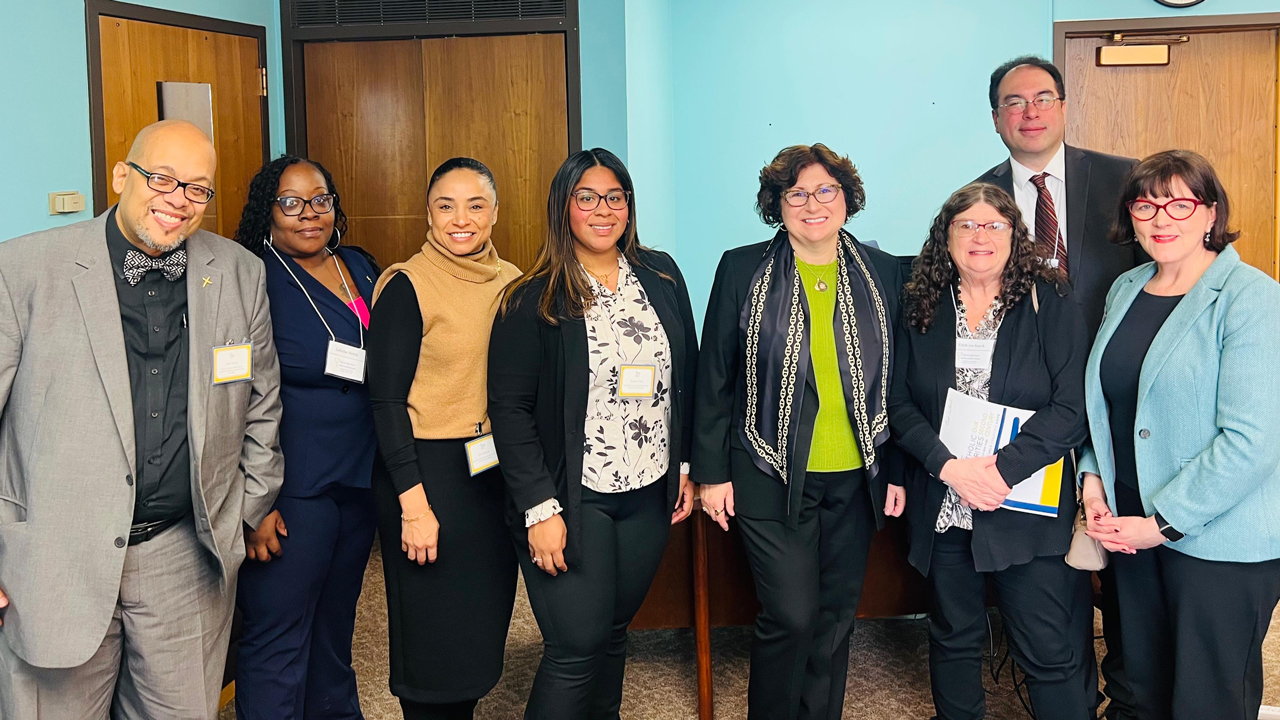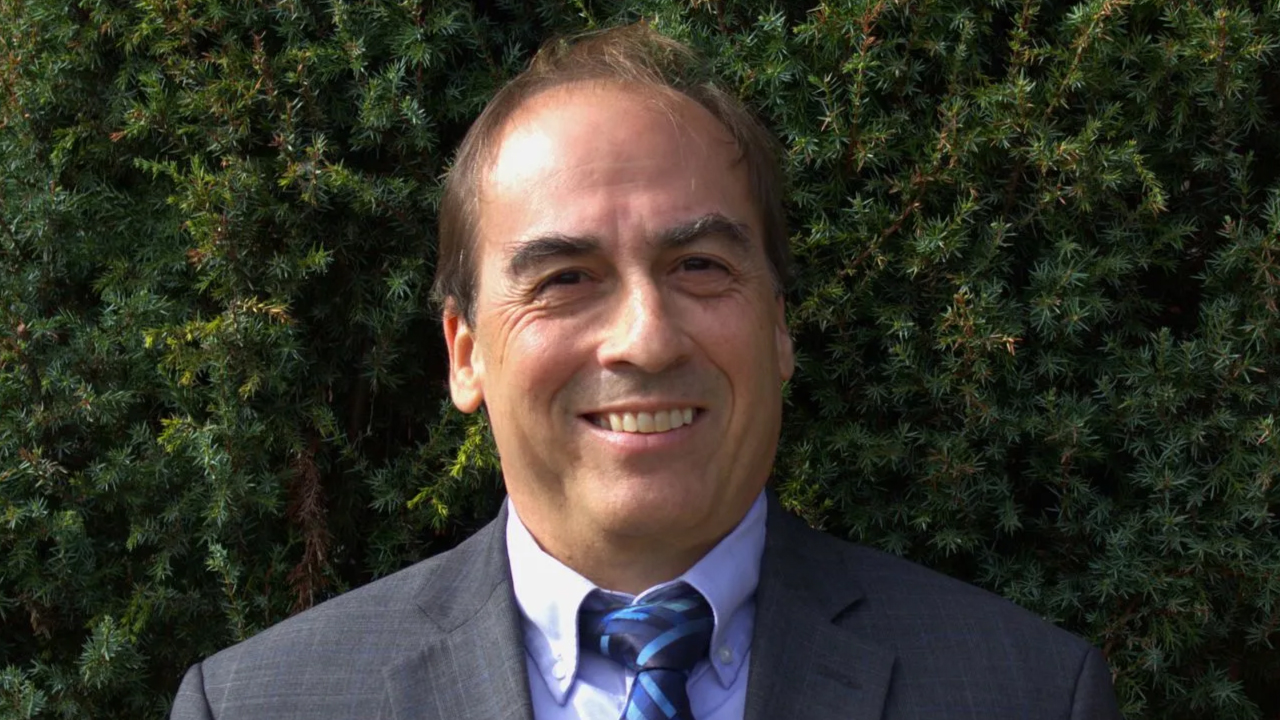On an early autumn morning in the Bronx, long before most New Yorkers have poured their first cup of coffee, a quiet line begins to form outside St. Simon Stock–St. Joseph Parish. Some arrive as early as 5:00 a.m., waiting patiently for the church’s Friday food pantry to open. By noon, hundreds of families will walk away carrying bags filled with rice, beans, milk, chicken, vegetables, and other essentials — each one a lifeline in a city where grocery prices keep rising and paychecks often fall short.
This lifeline is made possible by Catholic Charities of New York’s Feeding Our Neighbors program, which supports dozens of parish pantries across the Archdiocese.
At St. Simon Stock–St. Joseph Parish, the program sustains a ministry that has been feeding the community for decades. What began in the 1980s as a modest parish initiative has grown into a vital resource serving hundreds every week. It continues to thrive thanks to the commitment of staff, volunteers, partners — and the generous support of Catholic Charities donors.
As Father Michael Kissane, the parish’s pastor, puts it, the church has long been “an oasis in the desert” — a refuge where the hungry find sustenance, the weary find community, and faith becomes action.
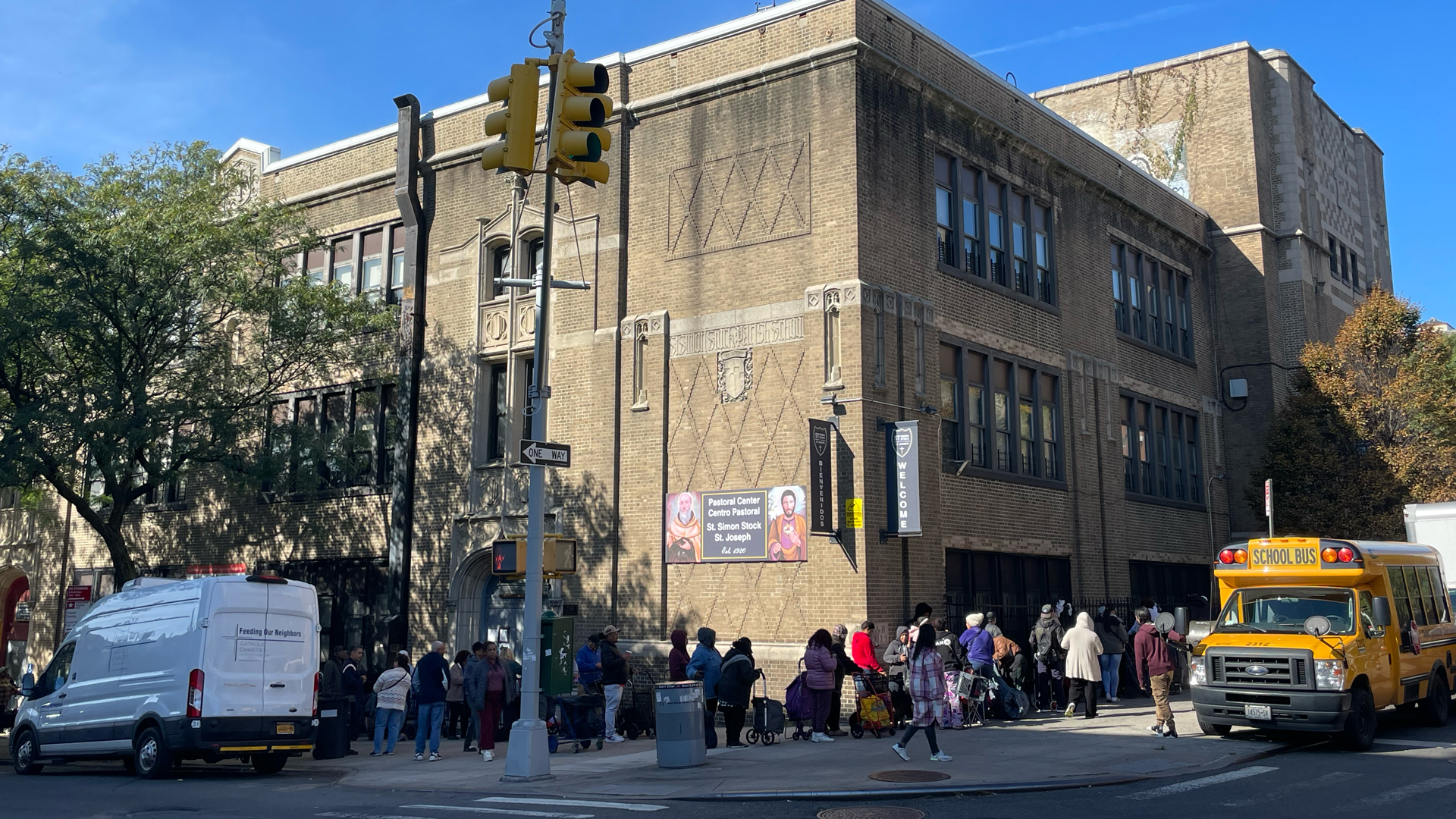
Community members lining around the block during a food pantry distribution event at St. Simon Stock–St. Joseph Parish in the Bronx.
Meeting Urgent Needs with Compassion
At the heart of this work is Kenya Taveras, the parish’s assistant administrator and the person who coordinates the pantry each week. Kenya has been running the pantry since 2017, and under her leadership, the program has expanded dramatically.
“We serve between 220 and 225 families every Friday. On special distribution days, like today, we see more than 400,” said Kenya.
Kenya ensures that the food distributed is not only abundant but also nutritious. “We try to provide fresh food — vegetables, rice, beans, milk, fish, chicken — because when you give nutrition to people, they know what to eat,” she said. Beyond food, the pantry also hosts workshops and health initiatives. For the past year, Kenya has partnered with Columbia University to provide Alzheimer’s screenings for seniors in the community.
But the need far outpaces the resources. “Sometimes we don’t have enough tickets for everyone who comes,” Kenya admitted, describing the small paper slips given out each morning to guarantee a bag of food. “I have to say, ‘I’m sorry, I don’t have more food today.’ Every week there are people we cannot serve.”
Even so, Kenya remains motivated by the people she encounters, especially the most vulnerable families. She recalls one mother who had recently arrived from the border, pregnant and without even a coat or shoes in the middle of winter. “We gave her hot chocolate, food, clothes, and a coat. She cried like a baby, saying, ‘God bless you, I had nothing,’” Kenya recalled. Years later, she still keeps in touch with her and her child.
Stories like these reflect a much larger crisis. More than 2 million New Yorkers — including one in four children — are food insecure, uncertain where their next meal will come from. As rising costs strain household budgets, food pantries like this one have become an essential lifeline.
Hunger isn’t confined to any one neighborhood. It’s a citywide emergency hiding in plain sight.
An Oasis in the Desert
For Father Michael Kissane, the parish’s longtime pastor, the food pantry is not just about groceries — it is about faith in action.
He explained that the parish has always welcomed waves of immigrants, beginning with Irish and Jewish families in the early 1900s and later Puerto Ricans, Dominicans, Mexicans, and more recently Central and South Americans. Throughout all these changes, one reality has remained constant: poverty and the need for help.
“This parish has always served immigrants,” he reflected. “Cardinal O’Connor once called this parish an oasis in the desert. That’s what it is for so many — a place of refuge, prayer, and hope, not only for Catholics but for the whole community.”
Today, many of the people who come to the pantry are senior citizens on fixed incomes, or mothers trying to raise children with limited resources. Father Michael said the pantry gives them not only food but also dignity, and the assurance that they are not forgotten.
He also pointed to the volunteers as a sign of the ministry’s strength. “Some of the people handing out food today once stood in line for food,” he said. “Now they’re giving back.”
At its heart, Father Michael sees the pantry as a continuation of the Gospel mission. He explained that Jesus reached out to the poor and fed the hungry, and that the parish is called to follow that same example.
Much of this work, he emphasized, would not be possible without Catholic Charities. The program provides essential resources — food, funding, and organizational support — that make it possible for the parish to serve hundreds of families every week. Father Michael expressed deep gratitude for this partnership, noting that without Catholic Charities, the parish would not be able to meet the growing demand for help.
“The only message I want to say to Catholic Charities is thank you for doing this event today, and also for all the help they’ve given us at different times to provide food to families,” Father Mchael said. “To Catholic Charities and all the major donors, thank you for what you do.”
That collaboration, combined with the commitment of parish volunteers, has allowed St. Simon Stock–St. Joseph Parish to live out its mission as a place of welcome. As Cardinal O’Connor once described it, the parish remains an “oasis in the desert”— a source of nourishment, dignity, and hope for all who seek help.
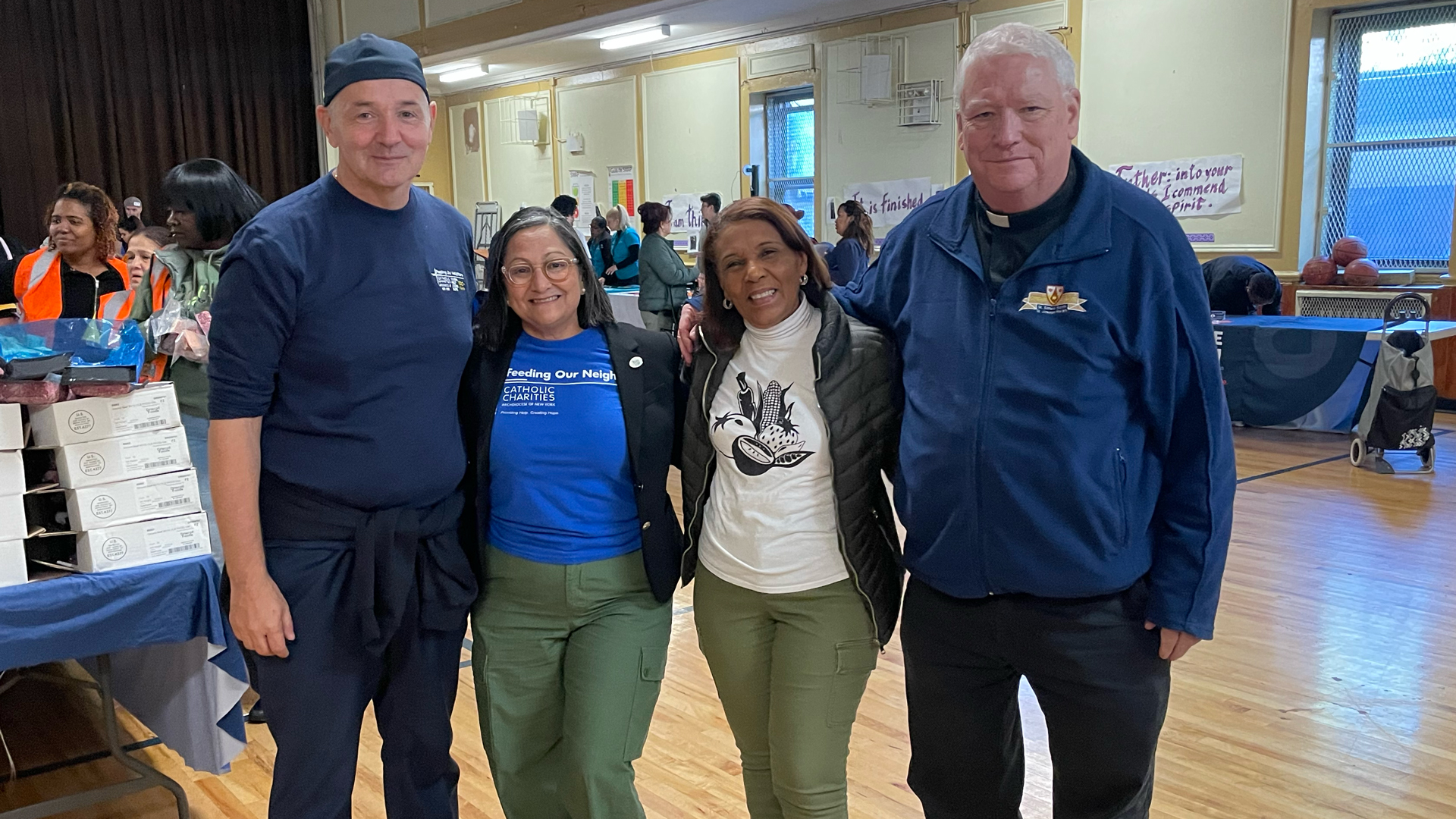
Antonio J. Fernández, CEO of Catholic Charities of New York, and Carmen Reyes of Catholic Charities Community Services, pictured with Kenya Taveras and Father Michael of St. Simon Stock–St. Joseph Parish.
A Community Effort, Rooted in Faith
The pantry does not run on food alone. It thrives because of a spirit of community and partnership. Father Von Erick Maria Sandoval, a Carmelite friar and vicar at the parish, describes it as an essential ministry of the church.
“This is a continuation of the Gospel message,” he said. “We don’t just provide the sacraments — feeding people spiritually with the Eucharist. We are also providing food to feed them physically.”
“First and foremost, I want to thank Catholic Charities and all the generous benefactors who make this program possible. On behalf of my parishioners at St. Simon Stock–St. Joseph Parish, and all those I serve — both near and far — thank you for your support,” Father Von Erick said.
“Please know that your money goes a long way,” he said. “Your support goes a long way to help people, especially within our own community.”
Stories of Resilience and Gratitude
The clearest testimony of the pantry’s impact comes from the people it serves. One client, a woman who lives near the parish, shared how the pantry has sustained her through a difficult transition.
“I love this because it helps people out — especially me, now that I’m no longer working and haven’t started getting my retirement,” she said. “I can cook meals with the food I receive —milk, eggs, everything I need. It makes all the difference.”
She also emphasized the hidden nature of hunger in New York City. “There’s a lot of people in need — even though you don’t always see it. People are not getting paid enough in their jobs, and they need extra help. This pantry is a blessing.”
Her message to Catholic Charities supporters was simple: “Thank you so much. May God bless you and keep providing for you, so you can keep providing for someone else.”
Stories like hers remind us that behind every bag of food is a story of perseverance — and a reminder of how faith can transform hardship into hope.
Faith in Action at St. Simon Stock-St. Joseph Parish
The food pantry at St. Simon Stock–St. Joseph Parish is just one of many across the Archdiocese of New York supported by Catholic Charities’ Feeding Our Neighbors program. Together, they form a network of hope — places where families can find nourishment for body and soul.
For Kenya Taveras, the mission is clear. “Pantries like this should always be open, because people really need them. Food prices are too high. Families with children are struggling. This is one of the best programs — it should never close,” she said.
Father Michael agrees. “This type of social ministry gives life to the parish,” he said. “As a Catholic Church and parish in this neighborhood, it’s not just about going to Mass. We have to put our faith into action.”
At St. Simon Stock–St. Joseph and across the Archdiocese, Catholic Charities’ Feeding Our Neighbors program continues to embody what it means to live the Gospel — transforming faith into nourishment, and compassion into community.
We count on your support to make services like this possible. You can provide help and create hope. Make a generous, tax-deductible gift today.


